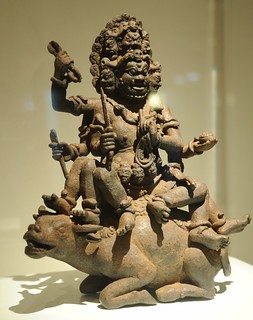
"Lies cannot lead to the truth"
N. Korzhavin
Progressives and liberals in the U.S. seem afflicted by a strange delusion: a belief in the goodness of secret organizations.
That belief manifests itself most conspicuously in the double-standard approach to such organizations as the Central Intelligence Agency (CIA), the Federal Bureau of Investigation (FBI), the Department of Homeland Security (DHS), the Transportation Security Administration (TSA), the National Security Agency (NSA) and others like them. In the face of new scathing revelations about the activities of these entities, the response is always along these lines: "Yes, of course, what they did was bad, but that's because they have bad people there now. As soon as they have good people again, you can be sure they'll return to the useful functions they were designed for--which is to protect us from our enemies, foreign and domestic."
This way of seeing things is very prevalent among political progressives. That's evident from the fact that, through all the years since 9/11, they have never contemplated the dismantling of DHS or the repeal of the Patriot Act. Obviously, no politicians in official positions have considered it either.
When I was a kid, boys loved to play the part of secret agents or spies. Movies involving such characters were our favorites. We liked the aura of those dangerous and powerful men, liked their license to kill and their own total invincibility, admired their irresistible attractiveness to women, and were thrilled by the idea of "killing for a good cause."
All this was of course quite innocent and understandable. As a child you can't feel the tragedy of death and you shouldn't. But, eventually, as I grew older and read real books and saw the documentaries about killing; when I had personal encounters with death and talked to those who saw it in abundance--I realized how stupid, cruel and illusory those images in spy films were. I saw how people really regard spies--with hate and disgust; how no good woman would even look at such rotten persons; how spies really are, beneath their glamorous image; and how corrupt and dangerous are the organizations they work for, which give them their license to kill. But to my amazement, I also found that not all people of my age grew up to share my disillusionment. I have met many middle-aged men who are still perversely fascinated with killing--who still admire the ability to kill at will, and who even regret they cannot do the killings themselves. These men are the perpetual little brats from my childhood. Stephen King is right: sometimes they come back.
The inhumanity and
insidious deeds of the secret
Let's design a thought experiment, say with respect to drone strikes. The purpose of the killer drone is to destroy a target. That target, by default, is a human being who is situated far away from the place in the U.S. where the drone "pilot" is located. Let's put aside for the moment the obvious lawlessness and murder that are involved here--a situation in which someone from this country wants to kill someone in another country with which we are not at war or engaged in any other active conflict. Let's concentrate instead purely on the methodology of the drone strike, following the "decision tree" from the drone on up.
The next branch up from the drone is the "pilot," the person who controls the drone's movements. That person knows how to kill and where to go to carry out the act, but he (or she) does not know who the target is or why the killing is to be performed. We relieve this person of his or her "ethics subroutines," because we accept that, in the role he or she is playing, natural human curiosity is not in play. The "pilot" will never ask questions about the targets and never express any doubts about the propriety of his or her actions.
As we ascend further up the "decision tree," the next branch we encounter will most likely be that of the direct supervisor of the "drone squadron," an officer or an agent of some rank who receives the order to execute. This officer specifies the parameters of the target and all the necessary coordinates and procedures. But, as for the customary "need to know" under which most critical military actions are undertaken, it is unlikely that the targeting information contains the name, bio or any other details about the intended human target, except for maybe a photo and the "reason" he is to be eliminated--perhaps by simple designation as an alleged terrorist operative.
Such a designation will serve this chain of command as the sufficient justification for a drone strike. Moreover, the supervisor does not receive the order to execute directly from an individual, but through a coded message of some sort from command headquarters. He therefore has no way, and is not expected to have a way, to verify or dispute the order, or to make sure it is the right thing to do. So, again, any moral consideration of the act to take place is not only discarded, but pre-empted as an option.
So now, climbing further up the "decision tree," we have reached the place--a command headquarters of some kind--where the strike order is actually issued. Considering the gravity of the decision to be made, one would think that the order would come from a small group of people who are specially qualified to rule on such life-or-death matters. But, in fact, very high-ranking officers or politicos are not involved, because not only would it be impractical to tie up such people in everyday operations, but people of power naturally prefer not to be associated too directly with politically sensitive decision-making.
The actual model for calling the shots on drone strikes might be described as a medieval "Venetian Triad" (so vividly described by Mark Twain in his book "The Innocents Abroad"), a very limited group of people, probably defined as "high operatives," who take over the function of deciding on life and death. It is important to recognize that in no way is the will of the people reflected through the political process in the decisions relating to drone strike targeting. Nor is any court involved, or a justice system. The attack is entirely a totalitarian scheme, the natural offspring of the structure and goals of the secret organization that administers it. That's simply how it works. Nothing personal.
To be fair, however, let's hypothesize that the "Venetian Triad" consists of several objectively dilligent people who do not take the process of decision lightly. Let's say they congregate and analyze the data provided. That data would consist of several reports on the behavior of the designated target. (These reports are, in fact, manhunt documents, tracing the movements of a suspected terrorist on the foreign soil, based on the information obtained through covert activities, 90% of which are violations of both local and international laws.) The data would also include a PowerPoint summary, consisting of several slides, the final one of which would indicate the certain "success" of the drone strike.
(Note: You can view every article as one long page if you sign up as an Advocate Member, or higher).





